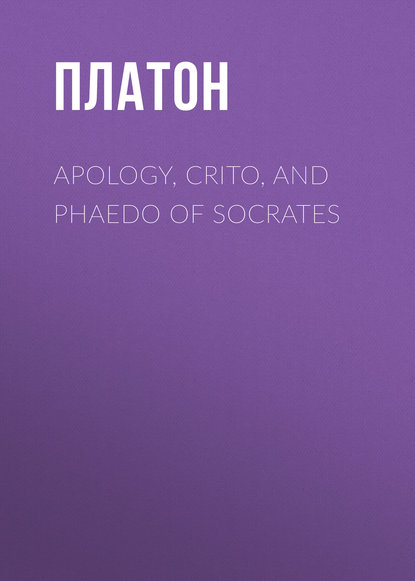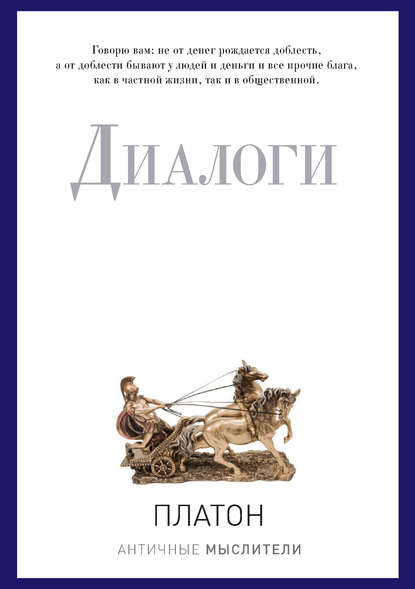 Полная версия
Полная версияПолная версия:
Платон Apology, Crito, and Phaedo of Socrates
- + Увеличить шрифт
- - Уменьшить шрифт

Plato
Apology, Crito, and Phaedo of Socrates
Introduction
Of all writers of speculative philosophy, both ancient and modern, there is probably no one who has attained so eminent a position as Plato. What Homer was to Epic poetry, what Cicero and Demosthenes were to oratory, and what Shakespeare was to the drama of England, Plato was to ancient philosophy, not unapproachable nor unapproached, but possessing an inexplicable but unquestioned supremacy.
The authentic records of his life are meagre, and much that has been written concerning him is of a speculative nature. He was born at Athens in the year 427 B.C. His father's name was Ariston, and his mother's family, which claimed its descent from Solon, included among its members many Athenian notables, among whom was Oritias, one of the thirty tyrants.
In his early youth Plato applied himself to poetry and painting, both of which pursuits he relinquished to become the disciple and follower of Socrates. It is said that his name was originally Aristocles, but that it was changed to Plato on account of the breadth of his shoulders and forehead. He is also said to have been an expert wrestler and to have taken part in several important battles.
He was the devoted friend and pupil of Socrates, and during the imprisonment of his master he attended him constantly, and committed to writing his last discourses on the immortality of the soul.
After the death of Socrates it is supposed that Plato took refuge with Euclides in Megara, and subsequently extended his travels into Magna Graecia and Egypt.
Upon his return to Athens he taught those who came to him for instruction in the grove named Academus, near the Cephisus, and thus founded the first great philosophical school, over which he continued to preside until the day of his death. Above the entrance to this grove was inscribed the legend: "Let no one ignorant of geometry enter here." Here he was attended by persons of every description, among the more illustrious of whom were Aristotle, Lycurgus, Demosthenes and Isocrates.
There is a story to the effect that Plato three times visited Sicily, once upon the invitation of the elder Dionysius, and twice at the earnest solicitations of the younger. The former he is said to have so seriously offended as to cause the tyrant to have him seized on his return home and sold as a slave, from which state of bondage he was, however, released by Anicerius of Cyrene.
The people of his time thought more of him than they did of all their other philosophers, and called him the Divine Plato. So great was the regard and veneration for him that it was considered better to err with Plato than be right with any one else.
The writings of Plato are numerous, and most of them are in the form of dialogues. The following pages contain translations of three of his works, viz.: "The Apologia," "The Crito" and "The Phædo," all of which have reference to the trial, imprisonment and death of Socrates.
"The Apologia" represents Socrates on trial for his life, undertaking his own defence, though unaccustomed to the language of the courts, the occasion being, as he says, the first time he has ever been before a court of justice, though seventy years of age. Plato was present at the trial, and no doubt gives us the very arguments used by the accused. Two charges were brought against Socrates – one that he did not believe in the gods recognized by the State, the other that he had corrupted the Athenian youth by his teachings. Socrates does not have recourse to the ordinary methods adopted by orators on similar occasions. He prefers to stand upon his own integrity and innocence, uninfluenced by the fear of that imaginary evil, death. He, therefore, does not firmly grapple with either of the charges preferred against him. He neither denies nor confesses the first accusation, but shows that in several instances he conformed to the religious customs of his country, and that he believes in God more than he fears man. The second charge he meets by a cross-examination of his accuser, Melitus, whom he reduces to the dilemma of charging him with corrupting the youth designedly, which would be absurd, or with doing so undesignedly, for which he could not be liable to punishment.
His defence, however, avails him nothing, and he is condemned by the judges to die by drinking the poisonous hemlock. In the closing part of "The Apologia" Socrates is represented as commenting upon the sentence which has been passed upon him, and as expressing his belief that in going to his death he is only passing to a better and a happier life.
In "The Crito" Socrates is represented in conversation with a friend of his named Crito, who had been present at his trial, and who had offered to assist Socrates in paying a fine, had a fine been the sentence imposed. Crito visits Socrates in his confinement to bring to him the intelligence that the ship, the arrival of which was to be the signal for his death upon the following day, would arrive forthwith, and to urge him to adopt the means of escape which had already been prepared. Socrates promises to follow the advice of Crito if, upon a full discussion of the matter, it seems right to do so. In the conversation which ensues Socrates argues that it is wrong to return evil for evil and that the obligations which a citizen owes to his State are more binding than those which a child owes his parents or a slave his master, and, therefore, it is his duty to submit to the laws of Athens at whatever cost to himself. Crito has no answer to make to this argument, and Socrates thereupon decides to submit to his fate.
Plato is said to have had two objects in writing this dialogue: First, to acquit Socrates of the charge of corrupting the Athenian youth; and, second, to establish the fact that it is necessary under all circumstances to submit to the established laws of his country.
"The Phædo" relates the manner in which Socrates spent the last day of his life and the circumstances attending his death. He is visited by a number of his friends, among whom are Phædo, Simmias and Crito. When his friends arrive they find him sitting upon a bed rubbing his legs, which have just been released from bonds. He remarks upon the unaccountable connection between pleasure and pain, and from this the conversation gradually turns to a consideration of the question of the immortality of the soul. He convinces his listeners of the pre-existence of the soul; but they are still skeptical as to its immortality, urging that its pre-existence and the fact that it is more durable than the body does not preclude the possibility of its being mortal. Socrates, however, argues that contraries cannot exist in the same thing at the same time, as, for example, the same object cannot partake of both magnitude and littleness at the same time. In like manner, heat while it is heat can never admit the idea of cold. Life and death are contraries and can never coexist; but wherever there is life there is soul, so that the soul contains that which is contrary to death and can never admit death; consequently the soul is immortal.
Having convinced his listeners, Socrates bathes and takes leave of his children and the women of his family. Thereupon the officer appears and tells him it is time for him to drink the poison. At this his friends commence to weep and are rebuked by Socrates for their weakness. He drinks the poison calmly and without hesitation, and then begins to walk about, still conversing with his friends. His limbs soon grow stiff and heavy and he lays himself down upon his back. His last words are: "Crito, we owe a cock to Æsculapius; pay it, therefore, and do not neglect it."
The Apology Of Socrates
I know not, O Athenians! how far you have been influenced by my accusers for my part, in listening to them I almost forgot myself, so plausible were their arguments however, so to speak, they have said nothing true. But of the many falsehoods which they uttered I wondered at one of them especially, that in which they said that you ought to be on your guard lest you should be deceived by me, as being eloquent in speech. For that they are not ashamed of being forthwith convicted by me in fact, when I shall show that I am not by any means eloquent, this seemed to me the most shameless thing in them, unless indeed they call him eloquent who speaks the truth. For, if they mean this, then I would allow that I am an orator, but not after their fashion for they, as I affirm, have said nothing true, but from me you shall hear the whole truth. Not indeed, Athenians, arguments highly wrought, as theirs were, with choice phrases and expressions, nor adorned, but you shall hear a speech uttered without premeditation in such words as first present themselves. For I am confident that what I say will be just, and let none of you expect otherwise, for surely it would not become my time of life to come before you like a youth with a got up speech. Above all things, therefore, I beg and implore this of you, O Athenians! if you hear me defending myself in the same language as that in which I am accustomed to speak both in the forum at the counters, where many of you have heard me, and elsewhere, not to be surprised or disturbed on this account. For the case is this: I now for the first time come before a court of justice, though more than seventy years old; I am therefore utterly a stranger to the language here. As, then, if I were really a stranger, you would have pardoned me if I spoke in the language and the manner in which I had been educated, so now I ask this of you as an act of justice, as it appears to me, to disregard the manner of my speech, for perhaps it may be somewhat worse, and perhaps better, and to consider this only, and to give your attention to this, whether I speak what is just or not; for this is the virtue of a judge, but of an orator to speak the truth.
2. First, then, O Athenians! I am right in defending myself against the first false accusations alleged against me, and my first accusers, and then against the latest accusations, and the latest accusers. For many have been accusers of me to you, and for many years, who have asserted nothing true, of whom I am more afraid than of Anytus and his party, although they too are formidable; but those are still more formidable, Athenians, who, laying hold of many of you from childhood, have persuaded you, and accused me of what is not true: "that there is one Socrates, a wise man, who occupies himself about celestial matters, and has explored every thing under the earth, and makes the worse appear the better reason." Those, O Athenians! who have spread abroad this report are my formidable accusers; for they who hear them think that such as search into these things do not believe that there are gods. In the next place, these accusers are numerous, and have accused me now for a long time; moreover, they said these things to you at that time of life in which you were most credulous, when you were boys and some of you youths, and they accused me altogether in my absence, when there was no one to defend me. But the most unreasonable thing of all is, that it is not possible to learn and mention their names, except that one of them happens to be a comic poet.1 Such, however, as, influenced by envy and calumny, have persuaded you, and those who, being themselves persuaded, have persuaded others, all these are most difficult to deal with; for it is not possible to bring any of them forward here, nor to confute any; but it is altogether necessary to fight, as it were with a shadow, in making my defense, and to convict when there is no one to answer. Consider, therefore, as I have said, that my accusers are twofold, some who have lately accused me, and others long since, whom I have made mention of; and believe that I ought to defend myself against these first; for you heard them accusing me first, and much more than these last.
Well. I must make my defense, then, O Athenians! and endeavor in this so short a space of time to remove from your minds the calumny which you have long entertained. I wish, indeed, it might be so, if it were at all better both for you and me, and that in making my defense I could effect something more advantageous still: I think, however, that it will be difficult, and I am not entirely ignorant what the difficulty is. Nevertheless, let this turn out as may be pleasing to God, I must obey the law and make my defense.
3. Let us, then, repeat from the beginning what the accusation is from which the calumny against me has arisen, and relying on which Melitus has preferred this indictment against me. Well. What, then, do they who charge me say in their charge? For it is necessary to read their deposition as of public accusers. "Socrates acts wickedly, and is criminally curious in searching into things under the earth, and in the heavens, and in making the worse appear the better cause, and in teaching these same things to others." Such is the accusation: for such things you have yourselves seen in the comedy of Aristophanes, one Socrates there carried about, saying that he walks in the air, and acting many other buffooneries, of which I understand nothing whatever. Nor do I say this as disparaging such a science, if there be any one skilled in such things, only let me not be prosecuted by Melitus on a charge of this kind; but I say it, O Athenians! because I have nothing to do with such matters. And I call upon most of you as witnesses of this, and require you to inform and tell each other, as many of you as have ever heard me conversing; and there are many such among you. Therefore tell each other, if any one of you has ever heard me conversing little or much on such subjects. And from this you will know that other things also, which the multitude assert of me, are of a similar nature.
4. However not one of these things is true; nor, if you have heard from any one that I attempt to teach men, and require payment, is this true. Though this, indeed, appears to me to be an honorable thing, if one should be able to instruct men, like Gorgias the Leontine, Prodicus the Cean, and Hippias the Elean. For each of these, O Athenians! is able, by going through the several cities, to persuade the young men, who can attach themselves gratuitously to such of their own fellow-citizens as they please, to abandon their fellow-citizens and associate with them, giving them money and thanks besides. There is also another wise man here, a Parian, who, I hear, is staying in the city. For I happened to visit a person who spends more money on the sophists than all others together: I mean Callias, son of Hipponicus. I therefore asked him, for he has two sons, "Callias," I said, "if your two sons were colts or calves, we should have had to choose a master for them, and hire a person who would make them excel in such qualities as belong to their nature; and he would have been a groom or an agricultural laborer. But now, since your sons are men, what master do you intend to choose for them? Who is there skilled in the qualities that become a man and a citizen? For I suppose you must have considered this, since you have sons. Is there any one," I said, "or not?" "Certainly," he answered. "Who is he?" said I, "and whence does he come? and on what terms does he teach?" He replied, "Evenus the Parian, Socrates, for five minæ." And I deemed Evenus happy, if he really possesses this art, and teaches admirably. And I too should think highly of myself, and be very proud, if I possessed this knowledge, but I possess it not, O Athenians.
5. Perhaps, one of you may now object: "But, Socrates, what have you done, then? Whence have these calumnies against you arisen? For surely if you had not busied yourself more than others, such a report and story would never have got abroad, unless you had done something different from what most men do. Tell us, therefore, what it is, that we may not pass a hasty judgment on you." He who speaks thus appears to me to speak justly, and I will endeavor to show you what it is that has occasioned me this character and imputation. Listen, then: to some of you perhaps I shall appear to jest, yet be assured that I shall tell you the whole truth. For I, O Athenians! have acquired this character through nothing else than a certain wisdom. Of what kind, then, is this wisdom? Perhaps it is merely human wisdom. For in this, in truth, I appear to be wise. They probably, whom I have just now mentioned, possessed a wisdom more than human, otherwise I know not what to say about it; for I am not acquainted with it, and whosoever says I am, speaks falsely, and for the purpose of calumniating me. But, O Athenians! do not cry out against me, even though I should seem to you to speak somewhat arrogantly. For the account which I am going to give you is not my own; but I shall refer to an authority whom you will deem worthy of credit. For I shall adduce to you the god at Delphi as a witness of my wisdom, if I have any, and of what it is. You doubtless know Chærepho: he was my associate from youth, and the associate of most of you; he accompanied you in your late exile, and returned with you. You know, then, what kind of a man Chærepho was, how earnest in whatever he undertook. Having once gone to Delphi, he ventured to make the following inquiry of the oracle (and, as I said, O Athenians! do not cry out), for he asked if there was any one wiser than I. The Pythian thereupon answered that there was not one wiser; and of this, his brother here will give you proofs, since he himself is dead.
6. Consider, then, why I mention these things: it is because I am going to show you whence the calumny against me arose. For when I heard this, I reasoned thus with myself, What does the god mean? What enigma is this? For I am not conscious to myself that I am wise, either much or little. What, then, does he mean by saying that I am the wisest? For assuredly he does not speak falsely: that he could not do. And for a long time I was in doubt what he meant; afterward, with considerable difficulty, I had recourse to the following method of searching out his meaning. I went to one of those who have the character of being wise, thinking that there, if anywhere, I should confute the oracle, and show in answer to the response that This man is wiser than I, though you affirmed that I was the wisest. Having, then, examined this man (for there is no occasion to mention his name; he was, however, one of our great politicians, in examining whom I felt as I proceed to describe, O Athenians!), having fallen into conversation with him, this man appeared to be wise in the opinion of most other men, and especially in his own opinion, though in fact he was not so. I thereupon endeavored to show him that he fancied himself to be wise, but really was not. Hence I became odious, both to him and to many others who were present. When I left him, I reasoned thus with myself: I am wiser than this man, for neither of us appears to know anything great and good; but he fancies he knows something, although he knows nothing; whereas I, as I do not know anything, so I do not fancy I do. In this trifling particular, then, I appear to be wiser than he, because I do not fancy I know what I do not know. After that I went to another who was thought to be wiser than the former, and formed the very same opinion. Hence I became odious to him and to many others.
7. After this I went to others in turn, perceiving indeed, and grieving and alarmed, that I was making myself odious; however, it appeared necessary to regard the oracle of the god as of the greatest moment, and that, in order to discover its meaning, I must go to all who had the reputation of possessing any knowledge. And by the dog, O Athenians! for I must tell you the truth, I came to some such conclusion as this: those who bore the highest reputation appeared to me to be most deficient, in my researches in obedience to the god, and others who were considered inferior more nearly approaching to the possession of understanding. But I must relate to you my wandering, and the labors which I underwent, in order that the oracle might prove incontrovertible. For after the politicians I went to the poets, as well the tragic as the dithyrambic and others, expecting that here I should in very fact find myself more ignorant than they. Taking up, therefore, some of their poems, which appeared to me most elaborately finished, I questioned them as to their meaning, that at the same time I might learn something from them. I am ashamed, O Athenians! to tell you the truth; however, it must be told. For, in a word, almost all who were present could have given a better account of them than those by whom they had been composed. I soon discovered this, therefore, with regard to the poets, that they do not effect their object by wisdom, but by a certain natural inspiration, and under the influence of enthusiasm, like prophets and seers; for these also say many fine things, but they understand nothing that they say. The poets appeared to me to be affected in a similar manner; and at the same time I perceived that they considered themselves, on account of their poetry, to be the wisest of men in other things, in which they were not. I left them, therefore, under the persuasion that I was superior to them, in the same way that I was to the politicians.
8. At last, therefore, I went to the artisans. For I was conscious to myself that I knew scarcely anything, but I was sure that I should find them possessed of much beautiful knowledge. And in this I was not deceived; for they knew things which I did not, and in this respect they were wiser than I. But, O Athenians! even the best workmen appeared to me to have fallen into the same error as the poets; for each, because he excelled in the practice of his art, thought that he was very wise in other most important matters, and this mistake of theirs obscured the wisdom that they really possessed. I therefore asked myself, in behalf of the oracle, whether I should prefer to continue as I am, possessing none, either of their wisdom or their ignorance, or to have both as they have. I answered, therefore, to myself and to the oracle, that it was better for me to continue as I am.
9. From this investigation, then, O Athenians! many enmities have arisen against me, and those the most grievous and severe, so that many calumnies have sprung from them, and among them this appellation of being wise; for those who are from time to time present think that I am wise in those things, with respect to which I expose the ignorance of others. The god, however, O Athenians! appears to be really wise, and to mean this by his oracle: that human wisdom is worth little or nothing; and it is clear that he did not say this to Socrates, but made use of my name, putting me forward as an example, as if he had said, that man is the wisest among you, who, like Socrates, knows that he is in reality worth nothing with respect to wisdom. Still, therefore, I go about and search and inquire into these things, in obedience to the god, both among citizens and strangers, if I think any one of them is wise; and when he appears to me not to be so, I take the part of the god, and show that he is not wise. And, in consequence of this occupation, I have no leisure to attend in any considerable degree to the affairs of the state or my own; but I am in the greatest poverty through my devotion to the service of the god.
10. In addition to this, young men, who have much leisure and belong to the wealthiest families, following me of their own accord, take great delight in hearing men put to the test, and often imitate me, and themselves attempt to put others to the test; and then, I think, they find a great abundance of men who fancy they know something, although they know little or nothing. Hence those who are put to the test by them are angry with me, and not with them, and say that "there is one Socrates, a most pestilent fellow, who corrupts the youth." And when any one asks them by doing or teaching what, they have nothing to say, for they do not know; but, that they may not seem to be at a loss, they say such things as are ready at hand against all philosophers; "that he searches into things in heaven and things under the earth, that he does not believe there are gods, and that he makes the worse appear the better reason." For they would not, I think, be willing to tell the truth that they have been detected in pretending to possess knowledge, whereas they know nothing. Therefore, I think, being ambitions and vehement and numerous, and speaking systematically and persuasively about me, they have filled your ears, for a long time and diligently calumniating me. From among these, Melitus, Anytus and Lycon have attacked me; Melitus being angry on account of the poets, Anytus on account of the artisans and politicians, and Lycon on account of the rhetoricians. So that, as I said in the beginning, I should wonder if I were able in so short a time to remove from your minds a calumny that has prevailed so long. This, O Athenians! is the truth; and I speak it without concealing or disguising anything from you, much or little; though I very well know that by so doing I shall expose myself to odium. This, however, is a proof that I speak the truth, and that this is the nature of the calumny against me, and that these are its causes. And if you will investigate the matter, either now or hereafter, you will find it to be so.





